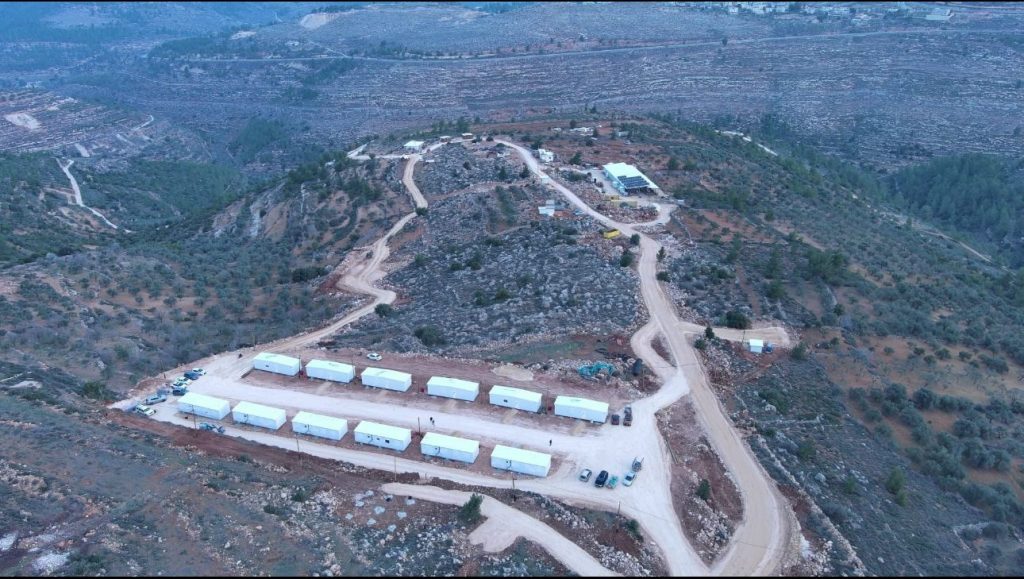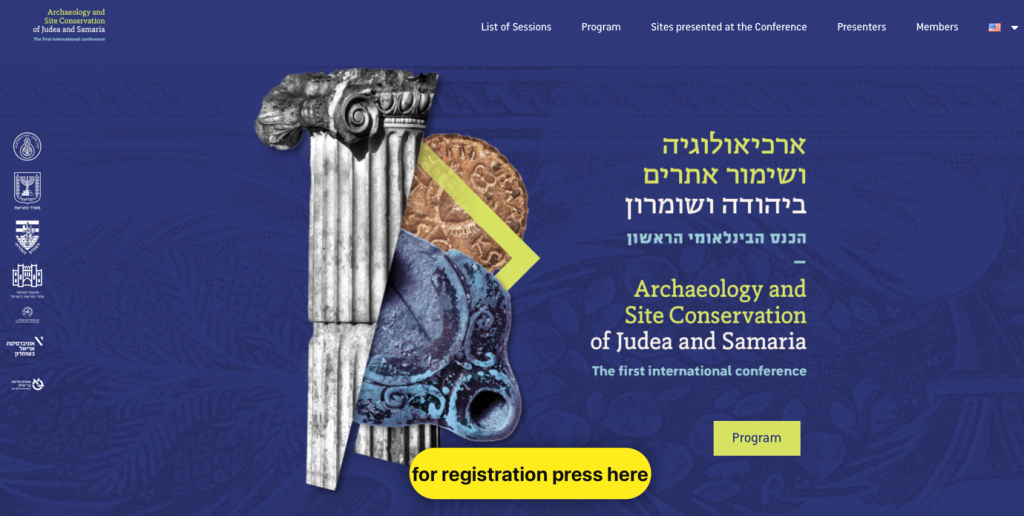In face of IAA’s opposition MK Amit Halevi promotes the establishment of a new body to oversee West Bank archaeology
In face of IAA’s opposition MK Amit Halevi promotes the establishment of a new body to oversee West Bank archaeology
Download as a PDF
In response to the Israel Antiquities Authority’s (IAA) objection to the bill to extend its jurisdiction into the West Bank, MK Amit Halevi (Likud) has proposed establishing a new administrative body to oversee antiquities in the West Bank which would fall under the Ministry of Heritage, rather than the Civil Administration. “I would have preferred to grant authority to the Israel Antiquities Authority,” Halevi said at the Knesset’s Education, Culture and Sports Committee session on the bill last week) 11th Feb). “However, given their opposition, this is the solution we found.”
Regardless of whether the IAA or any other administrative body assumes control, any replacement of a military authority with a civilian one would carry the same implications for compliance with international law and annexation. According to the bill, Israeli law would replace Jordanian law in governing antiquities in the West Bank. During last week’s committee session, the Ministry of Justice reiterated its concerns that the extraterritorial application of Israeli law could be perceived as annexation.

Alon Arad attending the Knesset committee session via zoom
The Staff Officer for Archaeology (SOA) within the Civil Administration (ICA), Benny Har-Even who attended the session, described the current situation as “terrorism against antiquities and Jewish history.” He argued that the proposed new authority must be empowered to protect archaeological sites.
Emek Shaveh’s ED, Alon Arad, who is recovering from an accident in hospital, requested to speak via zoom but was refused.
This was the second committee hearing following the preliminary vote in July as the bill advances to its first reading in the Knesset.
Emek Shaveh: The discussion made it clear that the bill is not aimed at protecting antiquities in the West Bank but solely at extending Israeli law to the occupied territories—essentially, annexation. Amit Halevi is advancing a destructive law, and the coalition is following him blindly, disregarding the firm opposition by professionals.
Also last week, the “First International Conference on Archaeology and Site Conservation of Judea and Samaria” took place at the Dan Hotel in Jerusalem. As mentioned in our previous update, it was sponsored by the Civil Administration’s Staff Officer for Archaeology (SOA) and the Ministry of Heritage, and featured scholars from major Israeli universities and international academic institutions.
The conference organisers asserted the event was not political. However, if academic excavations in the West Bank are truly apolitical, why did the SOA refuse to disclose the names of archaeologists conducting excavations in the region? In 2019, following a Freedom of Information request submitted by Emek Shaveh and Yesh Din, the High Court upheld the SOA’s request to keep the names concealed, citing concerns that archaeologists might face a potential boycott. How does this stance align with the claim that archaeology in the West Bank is not a political issue?
Last week, we shared an open letter from Professor Raphael (Rafi) Greenberg, Chair of our Board and a professor of archaeology at Tel Aviv University. During the conference, the London based Palestine Exploration Fund (PEF) —the oldest institution involved in the study of archaeology in the region—issued a statement criticising the conference: “Given the concerning news of increased, often violent settler activity in the area, and the intention to expand the Israel Antiquities Authority’s jurisdiction to include the West Bank, this conference normalises academic activities which are in breach of international law,” the statement read. The Palestinian Authority’s Ministry of Tourism also issued a statement condemning the conference.
Under international law, cultural heritage in a territory under military occupation is classified as protected property belonging to the occupied population. As such, archaeological activity in these areas must benefit the local population. Academic excavations, which do not fulfil this requirement, are therefore prohibited.
The conference, was an attempt in our opinion to whitewash Israeli archaeological activities in the West Bank. While several archaeologists at the event had voiced opposition to the above-mentioned proposed legislation to extend the Israel Antiquities Authority’s jurisdiction into the West Bank, we see this conference as part of a broader effort that includes the proposed bill. It comes on the heels of a wider campaign, led by settlers and right-wing Knesset members aimed at extending Israeli sovereignty over the West Bank through the ruse of heritage and archaeology.
Expansion of Settler Activity is Destroying UNESCO World Heritage Site Near Battir
On February 6, 2025, approximately twelve new mobile homes were installed at an outpost near Battir, located within the core zone of the UNESCO World Heritage Site “Land of Olives and Vines – Cultural Landscape of Southern Jerusalem, Battir.” Five days later, the Israeli government’s naming committee officially renamed the settlement from “Heletz” to “Bar Kokhva” and subsumed it under the Gush Etzion Regional Council.
The “Land of Olives and Vines” was inscribed as a World Heritage Site in 2014 for its unique cultural and agricultural landscape, characterized by ancient terraces and sophisticated irrigation systems that have been maintained by local Palestinian communities for hundreds of years. Recent developments, including the establishment of the Battir settler outpost in December 2023 and ongoing expansion, involve extensive destruction of ancient agricultural terraces, uprooting of trees and the expulsion of Palestinians from private land and water sources. In recent weeks, the outpost has expanded involving the paving of new roads and laying infrastructure for the arrival of new families, thus laying the ground for the expansion of the outpost into a settlement. The settlement, was approved in a cabinet decision in June as part of the legalisation of five isolated outposts and underwent a blueline mapping designating 600 dunam. This encroachment not only violates the basic human rights of the Palestinian communities who have been cultivating the terraces of the World Heritage Site for generations but is a direct attack on the living cultural landscape which qualified the Land of Olives and Vines as a UNESCO heritage site to begin with.

New mobile homes on Battir outpost (now called Bar Kokhva) (photo from “Neve Ori Farm” Facebook page)
The new settlement is part of a broader strategy to disrupt Palestinian territorial continuity west of Bethlehem. These actions not only fragment Palestinian space but also violate the 1972 Convention Concerning the Protection of World Cultural and Natural Heritage to which Israel is a signatory.
These developments join previous projects, such as the expansion of Road 60 in Beit Jala and plans to enlarge the Har Gilo settlement, further endangering the integrity of the World Heritage Site. For more about destruction of the World Heritage Site and plans for the settlement see here.
Emek Shaveh Condemns Legislative Assault on Civil Society and Human Rights in Israel
We join our colleagues in the Israeli human rights community in strongly opposing two draconian bills that passed a preliminary vote in the Knesset this week. These bills represent an unprecedented assault on civil society, aiming to silence dissent, criminalise transparency, and curtail the ability of organizations to challenge government actions in court.
The first bill seeks to prohibit public authorities and bodies from cooperating with the International Criminal Court (ICC) and criminalise individuals who provide the International Criminal Court with information or services, imposing penalties of up to five years in prison (Proposed Law: Protection of Israeli Public Officials from the Action of the International Criminal Court in The Hague against the State of Israel). According to the proposed law, disclosure of so-called “classified information” could carry a life sentence.
The second bill, spearheaded by MK Ariel Kellner, would impose an 80% tax on foreign government donations to NGOs and deny judicial access to organisations whose primary funding comes from foreign state entities. This legislation is a calculated effort to dismantle Israel’s human rights sector and prevent scrutiny of government policies, particularly in the occupied territories.
These legislative measures threaten those who seek to uphold justice and human rights. Now, more than ever, the international community must take a clear and unequivocal stand. We call on foreign governments, international institutions, and all those who value democracy and human rights to publicly reject these bills and make clear that Israel cannot erode fundamental rights while continuing to benefit from international partnerships.

